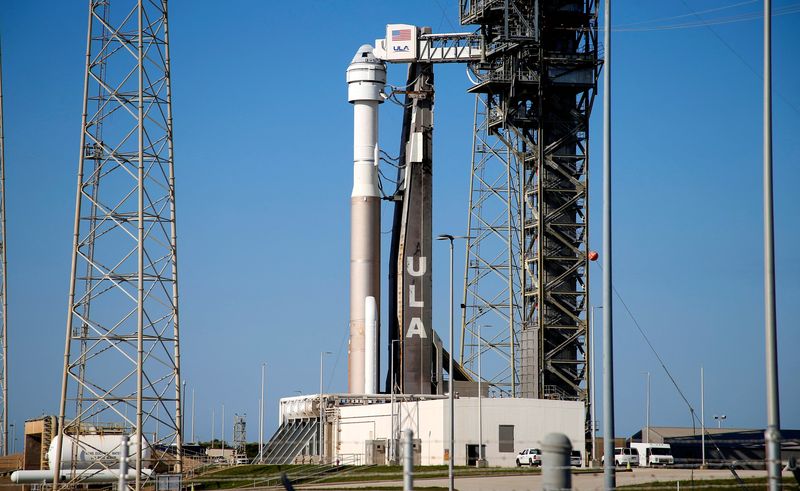Boeing’s Starliner capsule set for launch of first crewed space flight
2024.06.01 06:16
By Joey Roulette and Steve Gorman
CAPE CANAVERAL, Florida (Reuters) – Boeing (NYSE:)’s new Starliner astronaut capsule is poised for launch on Saturday in a much-delayed first crewed test flight, a milestone in the beleaguered aerospace giant’s aim to compete with Elon Musk’s SpaceX in the astronaut launch business.
The CST-100 Starliner with two astronauts aboard is due for liftoff at 12:25 p.m. ET (1625 GMT) from NASA’s Kennedy Space Center in Florida, strapped to an Atlas (NYSE:) V rocket from Boeing-Lockheed Martin joint venture United Launch Alliance (ULA).
A May 6 countdown was halted just two hours before launch time over a faulty pressure valve on the Atlas rocket. A helium leak and another issue subsequently were detected in Starliner’s propulsion system. All have been resolved, according to Boeing and NASA.
“This is a test flight, we know we’re going to learn some things,” Boeing’s commercial crew vice president Mark Nappi said during a news conference on Friday.
The gumdrop-shaped capsule and its crew are bound for the International Space Station (ISS), two years after the Starliner completed its first test voyage to the orbital laboratory without astronauts aboard.
Boeing, with its commercial airplane operations staggering from a series of crises involving its 737 MAX jetliners, needs a win in space for its Starliner venture, already several years behind schedule and more than $1.5 billion over budget.
The company is a longtime NASA contractor that has built modules for the decades-old ISS and rockets designed to loft astronauts toward the moon. But never before has it built its own operational spacecraft, a feat complicated by years of software issues, technical glitches and management shakeups on the Starliner program.
While Boeing has struggled, SpaceX has become a dependable taxi to orbit for the U.S. space agency, which is backing a new generation of privately built spacecraft for flying astronauts to low-Earth orbit and – under its ambitious Artemis program – on to the moon and eventually Mars.
Starliner would compete head-to-head with SpaceX’s Crew Dragon capsule, which since 2020 has been NASA’s only vehicle for sending ISS crew members to orbit from U.S. soil. NASA has long sought two U.S. rides to the station, in addition to the joint astronaut flights it conducts with Russia’s Soyuz rocket.
The inaugural crew for the seven-seat Starliner includes two veteran NASA astronauts: Barry “Butch” Wilmore, 61, a retired U.S. Navy captain and fighter pilot, and Sunita “Suni” Williams, 58, a former Navy helicopter test pilot with experience flying more than 30 different aircraft.
They have spent a combined 500 days in space over the course of two ISS missions each. Wilmore is the designated commander for Saturday’s flight, with Williams in the pilot seat.
Although Starliner is designed to fly autonomously, the crew can assume control of the spacecraft if necessary. The test flight calls for Wilmore and Williams to practice maneuvering the vehicle manually en route to the space station, where it will remain docked for at least eight days before returning to Earth.
If Boeing delays its Saturday launch attempt, the company has backup launch opportunities on Sunday, Wednesday and Thursday. And if it cannot make Thursday, some items on Starliner and the rocket would need to be replaced or replenished, spurring delays of weeks or potentially months given conflicting schedules with other ULA missions and the ISS.
Saturday’s flight marks the first crewed Atlas voyage to space since earlier versions of the storied rocket dynasty first sent U.S. astronauts, including John Glenn, to orbit during NASA’s Mercury program in the 1960s.

If all goes as planned, the capsule will arrive at the space station after a flight of about 26 hours and dock with the orbiting research outpost some 250 miles (400 km) above Earth.
Wilmore and Williams are expected to remain at the space station for about a week before riding the capsule back to Earth for a parachute and airbag-assisted landing in the U.S. Desert Southwest – a first for a crewed NASA mission.








